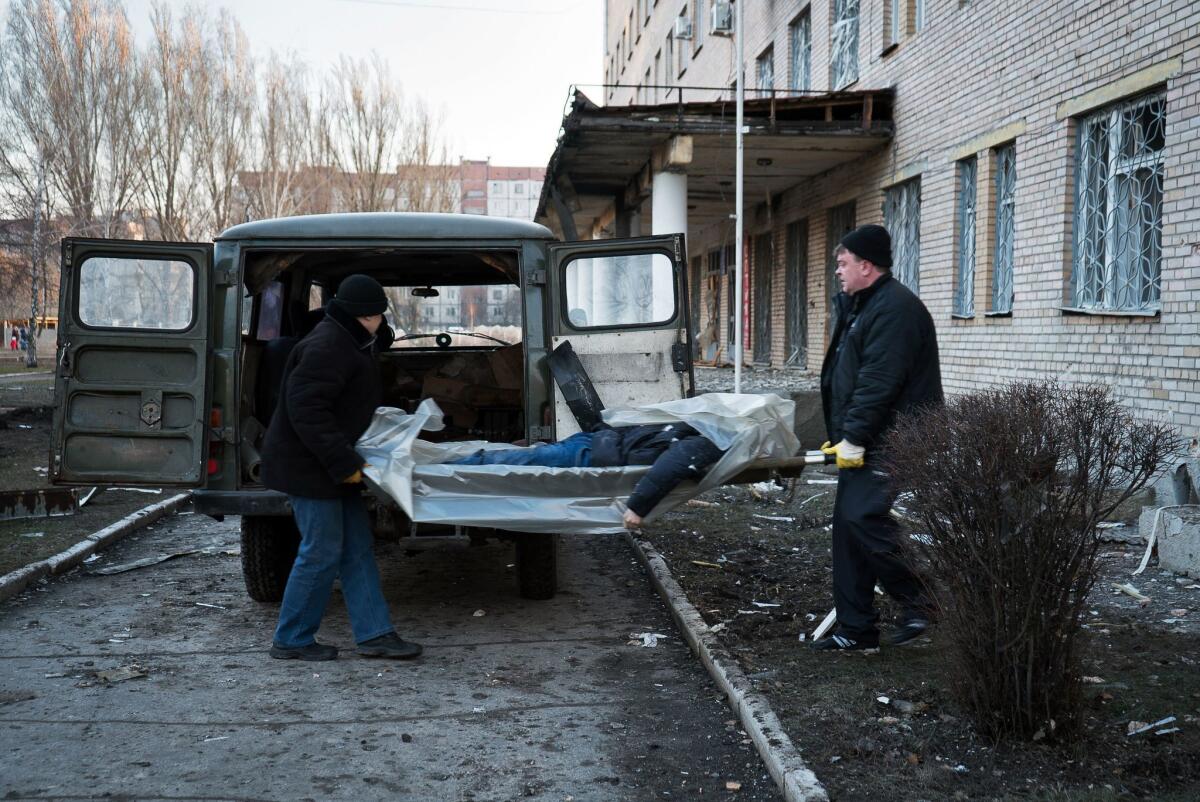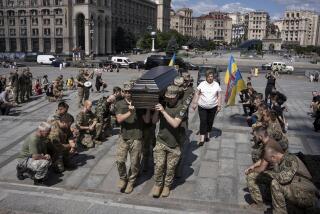Cluster bombs reported in Ukraine conflict as U.S. rethinks lethal aid

European security officials appealed to the warring parties in Ukraine on Wednesday to hold their fire for three days so that thousands of civilians can be evacuated from a battleground where hundreds have died in recent days, including in reported cluster-bomb attacks.
Fighting between Ukrainian government forces and pro-Russia separatists has intensified since a brief lull over the Christmas and New Year’s holidays, and fresh infusions of Russian arms and fighters have helped the rebels deal several strategic setbacks to the Kiev government.
The shifting ground in the 10-month-old battle between the Russian-backed rebels and Western-allied Ukrainian troops has rekindled a debate in Washington and in Brussels over whether Kiev’s allies should provide the embattled government with lethal aid.
Ukrainian President Petro Poroshenko expressed high confidence Wednesday that the United States would provide the government with the weaponry it needs to beat back the latest separatist advances, which included taking control of the devastated Donetsk international airport that had been fiercely fought over since May.
“I don’t have a slightest doubt that the decision to supply Ukraine with weapons will be made by the United States as well as by other partners of ours, because we need to have the capabilities to defend ourselves,” Poroshenko said during a visit to Kharkiv, Ukraine’s second-largest city, still government-controlled but bordering the separatist-occupied areas.
Later Wednesday, President Obama’s nominee as the next Defense secretary, Ashton Carter, told his Senate confirmation hearing that he was “very much inclined” to provide the weapons the Ukrainian government has been requesting for months. To date, U.S. and European assistance to the Kiev government has been limited to nonlethal military goods like night-vision goggles and body armor.
“My responsibilities would be to protect America and its friends and allies in a turbulent and dangerous world,” Carter told the Senate Armed Services Committee. “We need to support Ukraine in defending themselves.”
Polish officials said Tuesday they were prepared to provide arms to Ukraine, but other European Union members, in particular Germany, have warned against introducing more weapons into the conflict and called instead for stepped-up diplomatic intervention.
Intensified fighting around the strategic rail hub in the eastern Ukraine town of Debaltseve prompted officials of the European Union and the Organization for Security and Cooperation in Europe to call for a three-day cease-fire to evacuate civilians trapped between the front lines.
OSCE Chairman Ivica Dacic appealed to “all actors in and around the Debaltseve area to establish a local temporary truce for a minimum of three days, taking immediate effect.”
“The spiral of ever-increasing violence in eastern Ukraine needs to stop,” European Union foreign policy chief Federica Mogherini said in a statement, adding the 28-nation economic alliance’s weight to the appeal. “The shelling of civilians, wherever it happens, is a grave violation of international humanitarian law. Artillery should immediately be withdrawn from residential areas.”
There were no immediate responses from the combatants to the cease-fire appeal, which followed a United Nations human rights agency report a day earlier that at least 224 civilians were killed in artillery exchanges in the three weeks that ended Sunday.
U.N. Human Rights Commissioner Zeid Raad Hussein warned Ukrainian government forces and pro-Russia separatists on Tuesday that their disregard for the safety of civilians was a violation of international law and that they could face war crimes charges once the conflict ends.
But shelling continued Wednesday in Donetsk, the eastern industrial city that was home to a million residents before the war, and around Debaltseve and their other major stronghold, Luhansk.
Luhansk was the site of rocket attacks on Jan. 27 that killed two people and damaged numerous houses in a residential area, the OSCE reported Tuesday after inspecting the bombing scene. The monitoring team reported that the injuries, craters and structural damage were consistent with those “typically caused by shrapnel elements from cluster munition.”
The OSCE observer team’s report on Wednesday also cited the use of cluster munitions in an attack on the separatist-controlled village of Komsomolske on Monday in which a 37-year-old woman was killed and a 5-year-old girl gravely injured.
Four Ukrainian soldiers were killed in the previous 24 hours, Andriy Lysenko, spokesman for the National Security and Defense Council, told reporters in Kiev on Wednesday.
Russia’s Sputnik news agency reported from Donetsk that shelling hit a hospital on Wednesday and inflicted an unspecified number of fatalities.
The U.N. human rights report on Tuesday put the death toll from the fighting that began in April at 5,358, which it described as a “conservative estimate.”
Separatists occupied government buildings in Donetsk and Luhansk regions last spring after Russian President Vladimir Putin sent paratroopers to seize Ukraine’s Crimean peninsula in late February. Russia annexed Crimea, which is home to its Black Sea fleet, three weeks later.
Follow @cjwilliamslat for the latest international news 24/7
More to Read
Sign up for Essential California
The most important California stories and recommendations in your inbox every morning.
You may occasionally receive promotional content from the Los Angeles Times.











